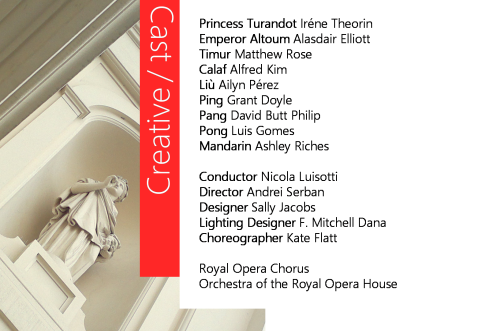 Guilty as charged…I missed the last run of Traviata with Ailyn Pérez in 2011 and was reassured that greatness was achieved. Having seen her give her all in recitals, Turandot and Manon I didn’t hesitate to grab a ticket and be at her first night this time around. I didn’t intent to write a blog about it, but since I was totally bowled over with the central performance, here my brief account.
Guilty as charged…I missed the last run of Traviata with Ailyn Pérez in 2011 and was reassured that greatness was achieved. Having seen her give her all in recitals, Turandot and Manon I didn’t hesitate to grab a ticket and be at her first night this time around. I didn’t intent to write a blog about it, but since I was totally bowled over with the central performance, here my brief account.
I can report a sensational performance built on great attention to the text taking place. She uttered every word with complete understanding of Violetta’s motives and fears. A deep sense of experience permeating every phrase. Her intense physical acting was perfectly married to some extraordinary vocal shading.
In Act Two her confrontation with Germont Père was dignified and had the requisite struggle with her self, her life choices and how polite society view her. Her Non Sapete hurled across the table at him as a protestation of defiance and hurt. She was aided by the fine acting of Simon Keenlyside who despite the fact he is missing the sheer heft of a true Verdi baritone avoided the clichés if portraying a monster and instead he was a family man blinded by his own small world to see Violetta’s raison d’être. Their confrontation was in keeping with the period aesthetic of Richard Eyre’s production but was imbued with personality and life experience. The trajectory of the character by Pérez was a complete life in 2 and a half hours. Her frivolous toasting of the ice sculpture in Act One with the resulting clinking noise causing a ripple of laughter was a great signifier of a Violetta that is playful and fun.
Her Act Two gambling scene progressing from false defiance to humiliation was beautifully acted. Her Alfredo, di questo core supported by a thin column of air the testament of a woman broken but despite it all filled with love and compassion. It was so brilliantly acted it left little doubt in our minds of her honesty. This great central performance was supported by the undeniable chemistry with Stephen Costello (it helps being married to Alfredo, obviously) his singing seemed at the start, nervous but as the night progressed kept improving. Unfortunately his acting was not as fluent and kept on seeming too stiff at times.
The Third Act was the tour de force one can hope. The logical conclusion of the trajectory of the character. The fall from grace, rejection of the church that provided succour and return to a love affair doomed by death. It was a gripping ride from her waking up in her bed to the death in Alfredo’s arms. So frequently this scene can be disappointing but her Addio del Passato was spine-tingling in its sadness, sung with huge emotional commitment and elegance. The attention to every word again to the fore. When reading Germont Père”s letter her excruciatingly dry cry emitted with her È tardi was a suitable flourish to this great performance. Worth mentioning the excellent contributions by the ROH’s young artists. Ashley Riches, Nadezhda Karyazina and David Butt Philip whose small character parts made a big impact.
As many others I have listened for years and years the incredibly exciting 1955 live recording with Maria Callas from La Scala. An archetypal example of what can be done with Verdi’s morality tale. Last night Ailyn Pérez touched the same level of greatness with a truly stunning performance.
The show on 20 May will be broadcast live online, DO NOT MISS IT! 
Curtain call video
Some Tweets












